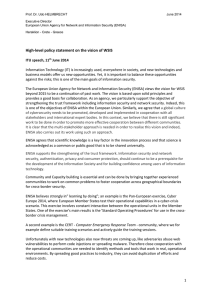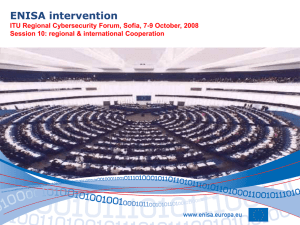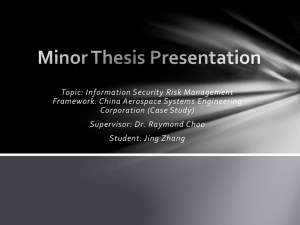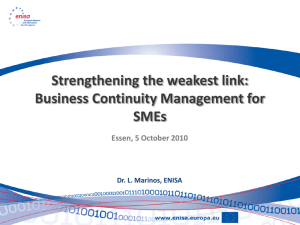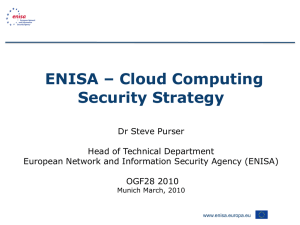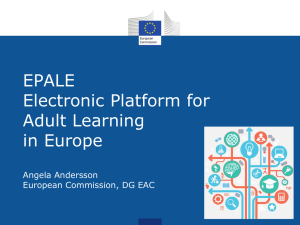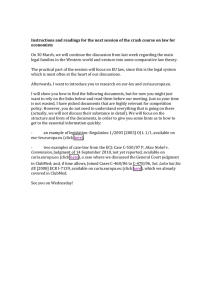ENISA and standards Sławomir Górniak ITU SG17 meeting Follow ENISA:
advertisement
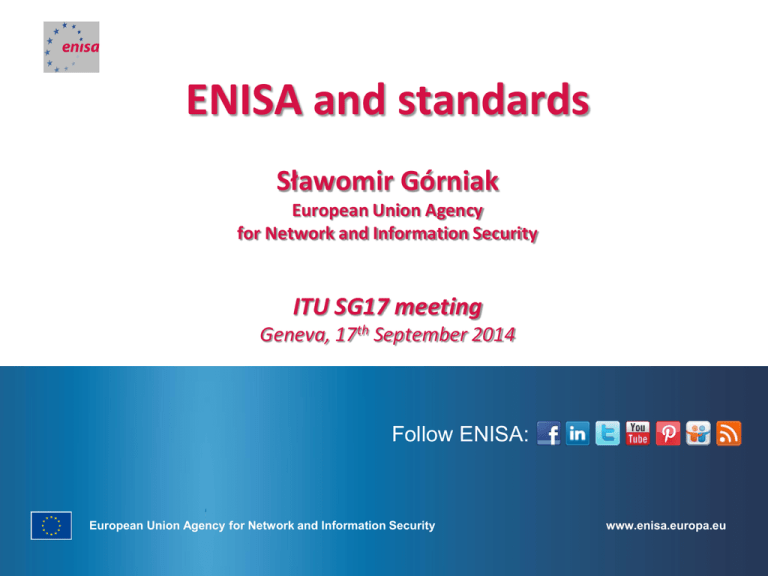
ENISA and standards Sławomir Górniak European Union Agency for Network and Information Security ITU SG17 meeting Geneva, 17th September 2014 Follow ENISA: European Union Agency for Network and Information Security www.enisa.europa.eu European Union Agency for Network and Information Security • Established in 2004 • Centre of expertise: Writing reports that analyse data on security practices in Europe and on emerging risks (e.g. cloud computing, exercises, national contingency plans) • Supporting the European Commission & Member States in their policy initiatives (e.g. setting up and training CERTs, seminars for national exercises) • Facilitating cross-border cooperation (e.g. supporting cyber security exercises) • Ensuring a coherent pan-European approach (e.g. supporting the implementation of article 13a) www.enisa.europa.eu 2 ENISA activities Policy Implementation Recommendations Mobilising Communities Hands on www.enisa.europa.eu ENISA efforts • Identification of risks associated with new technologies affecting the daily life of citizens • Cyber crisis cooperation at EU and international level and development of capabilities • Facilitating Public-Private cooperation • Improving transparency of security incidents • Enabling communities to improve NIS: capacity building with regard to the CERT community and application of good practice for CERTs • Ensuring a strong EU response to cybercrime • Supporting R&D investments and strengthen the competitiveness of EU’s security industry • Promote personal data protection www.enisa.europa.eu 4 ENISA and standards • Regulation (EC) 460/2004 – Art. 3 – In order to ensure that the scope and objectives set out in Articles 1 and 2 are complied with and met, the Agency shall perform the following tasks: • (g): to track the development of standards for products and services on network and information security • However – (12) The exercise of the Agency's tasks should not interfere with the competencies and should not pre-empt, impede or overlap with the relevant powers and tasks conferred on: • the European standardisation bodies, the national standardisation bodies and the Standing Committee as set out in Directive 98/34/EC of the European Parliament and of the Council of 22 June 1998 laying down a procedure for the provision of information in the field of technical standards and regulations and of rules on Information Society Services(14), www.enisa.europa.eu 5 ENISA and standards • Regulation 526/2013, Art.3.1d • Support research and development and standardisation, by: – (i) facilitating the establishment and take-up of European and international standards for risk management and for the security of electronic products, networks and services; – (ii) advising the Union and the Member States on research needs in the area of network and information security with a view to enabling effective responses to current and emerging network and information security risks and threats, including with respect to new and emerging information and communications technologies, and to using risk-prevention technologies effectively; www.enisa.europa.eu ENISA approach to standards • Aim: promotion of best practices through SDOs • ENISA role: interface between private sector, public sector, SDOs • Short- and mid-term goals – Formal cooperation with SDOs and specific WGs – Working collaboration with SDOs • Long-term goal – Review of and participation in NIS standardisation activities – Proposal of standards, via means of proposals for standardisation mandates. www.enisa.europa.eu ENISA and SDOs • Established collaboration agreements with: – ISO SC27 (Liaison) – ETSI (MoU) • Exchange of information of mutual interest • Organisation of joint meetings and workshops • ENISA to channel standardisation activities to ETSI, if appropriate • Exchange of working documents, within well defined frames • ENISA to nominate observers for ETSI Technical Bodies – CEN CENELEC (MoU) – ITU (MoU started!) • ENISA aligns key activities with the work of SDOs – ETSI TISPAN on CIIP, ESI on eID, CLOUD on cloud certification – CEN CENELEC on smart grids; – ISO SC 27 in the area of privacy; www.enisa.europa.eu Challenges from EU perspective • Lack of consistent strategy towards standards • Recognized shortcomings of the current approach • Need establishing a small number of key initiatives at EU level • Improve coordination between EU funded R&D and SDOs • Possible ‘vehicles’ for such a coordination: – ETSI CEN CENELEC CSCG – Horizon 2020 www.enisa.europa.eu ETSI CEN-CENELEC Cyber Security Coordination Group (CSCG) • Give strategic advice to the technical committees of CEN, CENELEC and ETSI • Develop a gap analysis of European and International Standards on cyber security • Define of joint European requirements for European and International Standards on cyber security • Establish a European roadmap on standardization of cyber security • Act as contact point for all questions of EU institutions relating to standardization of cyber security • Suggest a joint US and European strategy for the establishment of a framework of International standards on cyber security www.enisa.europa.eu CSCG Action Plan • • • • • • • • • #1 #2 #3 #4 #5 #6 #7 #8 #9 – – – – – – – – – www.enisa.europa.eu Governance Framework Common Understanding Of “Cyber Security” Trust In The European Digital Environment European Pki And Cryptographic Capabilities European Cyber Security Label European Cyber Security Requirements European Cyber Security Research Eu Industrial Forum On Cyber Security Standards Eu Global Initiative On Cyber Security Standards 11 Governance framework Strategic options • General recommendations – Lack of consideration from stakeholders • Recommendations targeting organisations – Examples: ISO 27k, 31k – Regulated environment – EU framework for requiring a lot of resources (research, following-up activities) • Recommendations for products and services – Similarities: Common Criteria – Problem in definition of ‘products’ and ‘services’ in the converging world • Recommendations targeted on (classes of) functions, products or services – “Mash-up" approach – “ad hoc” solution – Functions, products, services to be selected following an appropriate process www.enisa.europa.eu 12 European Cyber-Security Label www.enisa.europa.eu 13 Example: ETSI ESI “Algo paper” • ETSI TR 119 312 – Business Guidance on Cryptographic Suites • ETSI TS 119 312 – Cryptographic suites • ENISA reports 2013 – Recommended cryptographic measures – Algorithms, Key Sizes and Parameters • Collaboration 2014 –> www.enisa.europa.eu 14 Example: Security measures for smart grids - conceptual model • Milestones: • Risk assessment (by operators) • Appropriate measures (baseline) • 3 Sophistication levels per each measure (implementation sophistication) • 11 control domains • 42 measures www.enisa.europa.eu .. .. .. • • • .. .. .. • • • .. .. .. • • • .. .. .. • • • .. .. .. • • • .. .. .. • • • .. .. .. • • • .. .. .. CD1 – Security Governance Matrix applied for the method to define Security Measures Information security policy 1 • • • Organization of information security 2 Information security procedures – Risk instead of compliance based approach – Three level approach • Requirement 1 • Requirement 2 • .. 3 Security Measures • Approach Requirements Sophistication levels – 1st version, ENISA publication, Dec 2012 – 2nd version, EG2 security measures, April 2014 – Mapping between security measures and M/490 SGIS security levels CD2 Control Domains - set of practices CDN European Union Agency for Network and Information Security Science and Technology Park of Crete P.O. Box 1309 71001 Heraklion Crete Greece Follow ENISA http://www.enisa.europa.eu www.enisa.europa.eu 16
